
In the Biblical story of the Tower of Babel, the descendants of Noah come together to build a tower that would stretch so high it would reach God in the heavens. Most interpretations say that God, seeing this, curses the people so that they speak many languages and cannot understand one another, which foils their plan to build the tower.
These interpretations understand the story of the Tower of Babel as one of hubris and punishment. The peoples’ goal seems to be to try to reach the heavens and increase their connection with God, or to try to become more holy, but God seems to find fault with this, and so God confuses them and disrupts their plan.
But this idea doesn’t sit right with me, that God might want to prevent the people from working together and building together. I like to think that this is something God would want to encourage.
In the story of the Tower of Babel, I would suggest that perhaps God’s actions are meant to be seen not as punishment, but as guidance and as an opportunity.
Maybe the lesson that God is teaching is that if the people want to increase their holiness, the solution is not to build a tower when everyone was in agreement and spoke in one voice. Maybe instead the true path to holiness was still building the tower, but finding a way to do so despite being from different cultures and speaking many languages. Maybe God is saying that if the people could still build their tower despite speaking in many voices, then they truly would have achieved holiness together.
I grew up in Atlanta, where it often seems like there are a variety of synagogues for every community. There’s a lot to appreciate about living in an area with a large Jewish population, but at the same time, I think something is lost, too.
When there are so many synagogues, if one temple doesn't meet your needs, there's another one around the corner that might suit you better. The Jewish communities in those places may have a greater presence, but with so many places to worship, you end up with synagogues where people tend to think and believe the same way. You end up with synagogues where people speak with just one voice.
In contrast, I am currently serving as president of Temple Emanu-El in Dothan, AL, the only synagogue in southeast Alabama within a 100-mile radius.
At Temple Emanu-El, we speak in many voices. There are congregants who grew up here and raised children here, and who we have to thank for keeping the temple alive and vibrant to this day. There are those who moved to Dothan for family or work and sought out the temple to connect with a Jewish community. There are the members who heard or read about the great things going on at Temple Emanu-El and journeyed here with the help of the Blumberg Family Jewish Community Services relocation project specifically to be a part of our congregation. There are the students and military families who enrich our worship even if they’re only with us a short time.
We are from the South and from the North. We are from the West Coast and from the East Coast. We vote for different political candidates and believe differently on international issues. We were raised in the many different traditions of Judaism, or we came to Judaism later in life, or we celebrate Judaism with our families.
We speak in many voices.
It may sometimes feel lonely being a small Jewish congregation in southeast Alabama. Being members of Temple Emanu-El, however, affords us a special opportunity. When I tell people about my congregation, I always speak with pride about what a melting pot of cultures our temple is, but that we still worship and celebrate and build together. I tell them what a thriving community we have, both despite and because of the fact that we speak in many voices. That's a unique and wonderful benefit of being a member of Temple Emanu-El, and it's not something you can experience at just any synagogue.
Just like an orchestra could not make beautiful music if all the instruments were the same, neither would Temple Emanu-El be as vibrant if we all spoke in one voice. As we enter the year 5776, I look forward to continuing to hear our many voices, and to seeing what our congregation can continue to build together in the new year.
Brian Seidman is president of Temple Emanu-El in Dothan, AL, the only synagogue in southeast Alabama within a 100-mile radius. He is a former journalist and college English instructor; he has been the managing editor of publisher NewSouth Books since 2004.
Related Posts

Pandemic Passover, Take Two: The Long Journey through the Wilderness

"Tour to the Wonderful": This Couple Drove Across America to Join Multiple Reform Synagogues

